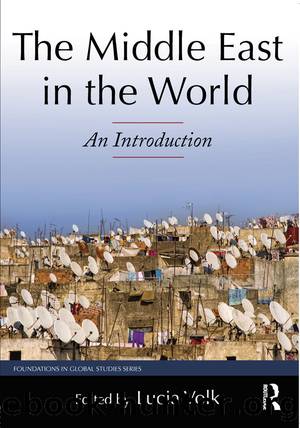The Middle East in the World: An Introduction (Foundations in Global Studies) by Unknown

Author:Unknown
Language: eng
Format: epub
Publisher: Taylor and Francis
Published: 2015-02-10T16:00:00+00:00
Rise of the JDP and the Dismantling of Constraints
The closure of the VP created an opening for a younger generation of political activists to form the JDP in 2001. Officially, the party was founded by Abdullah Gül and other veterans of the WP and the VP. The real leader, however, was Recep Tayyip Erdoğan, who at the time was legally banned from politics. Erdoğan had first come to public prominence in 1994 as a member of the WP and the elected mayor of metropolitan Istanbul. Many credit the vastly improved municipal services during his mayoral tenure with paving the way for the WP’s rise to power in national elections a year later. After the WP’s closure in 1998, Erdoğan was tried and imprisoned on charges of “inciting religious hatred” and encouraging the overthrow of the government by reciting a short poem written almost a century earlier. The now defunct State Security Court (a joint civilian-military tribunal) that convicted him also banned him from politics for life.
Erdoğan’s candidacy in the November 2002 parliamentary elections was rejected by the election board due to his earlier conviction, but the JDP won the majority of the seats in parliament and formed Turkey’s first single-party government in more than a decade. The JDP amended the constitution to allow Erdoğan to run, and then held a special election to elect him to the parliament. He assumed the post of prime minister in early 2003. Since then, the JDP has won two other parliamentary elections, each time increasing its share of the popular vote (47 percent in 2007, and almost 50 percent in 2011).
JDP began its tenure by emphasizing its pro-Western credentials. Whereas Erbakan had begun his term with a tour of Muslim countries, including Libya and Iran, and had expressed ambivalence about Turkey’s membership of the European Union (EU), Erdoğan toured the capitals of Europe and moved quickly to adopt a number of reforms long sought by the EU. The democratic reforms also appealed to many liberal, secular Turks who were tolerant of public religiosity, and who had never supported the post-1982 military order and the “February 28 process.” Erdoğan also strengthened Turkey’s ties with the United States and even indicated that he would allow U.S. troops to invade Iraq through the Turkish border, a proposal that the Turkish parliament rejected shortly before the start of the 2003 Iraq War. By this time, however, the George W. Bush administration was looking at Turkey as a model Muslim democracy, and thus blamed Turkey’s military, not the JDP, for the decision not to cooperate with U.S. plans. Military cooperation with the United States, however, continued on other issues. The JDP’s overall pro-Western policies had the effect of distancing the military from its erstwhile international supporters at a time when the February 28 process had alienated many liberal Turks. From then on, the military was gradually pushed out of politics and returned to its barracks.
On the domestic front, the JDP initially avoided controversial issues that might provoke the military and its secular allies.
Download
This site does not store any files on its server. We only index and link to content provided by other sites. Please contact the content providers to delete copyright contents if any and email us, we'll remove relevant links or contents immediately.
The Secret History by Donna Tartt(18052)
Red Sparrow by Jason Matthews(5165)
Harry Potter 02 & The Chamber Of Secrets (Illustrated) by J.K. Rowling(3531)
In a Sunburned Country by Bill Bryson(3330)
Drawing Cutting Edge Anatomy by Christopher Hart(3256)
Figure Drawing for Artists by Steve Huston(3242)
Harry Potter and the Prisoner of Azkaban (Book 3) by J. K. Rowling(3082)
The Daily Stoic by Holiday Ryan & Hanselman Stephen(3075)
Japanese Design by Patricia J. Graham(2976)
The Roots of Romanticism (Second Edition) by Berlin Isaiah Hardy Henry Gray John(2801)
Make Comics Like the Pros by Greg Pak(2731)
Stacked Decks by The Rotenberg Collection(2662)
Harry Potter and the Deathly Hallows (7) by J.K. Rowling(2518)
Draw-A-Saurus by James Silvani(2475)
Tattoo Art by Doralba Picerno(2466)
On Photography by Susan Sontag(2459)
Foreign Devils on the Silk Road: The Search for the Lost Treasures of Central Asia by Peter Hopkirk(2372)
Churchill by Paul Johnson(2330)
Drawing and Painting Birds by Tim Wootton(2311)
